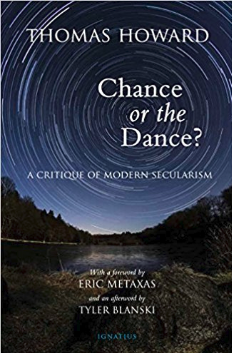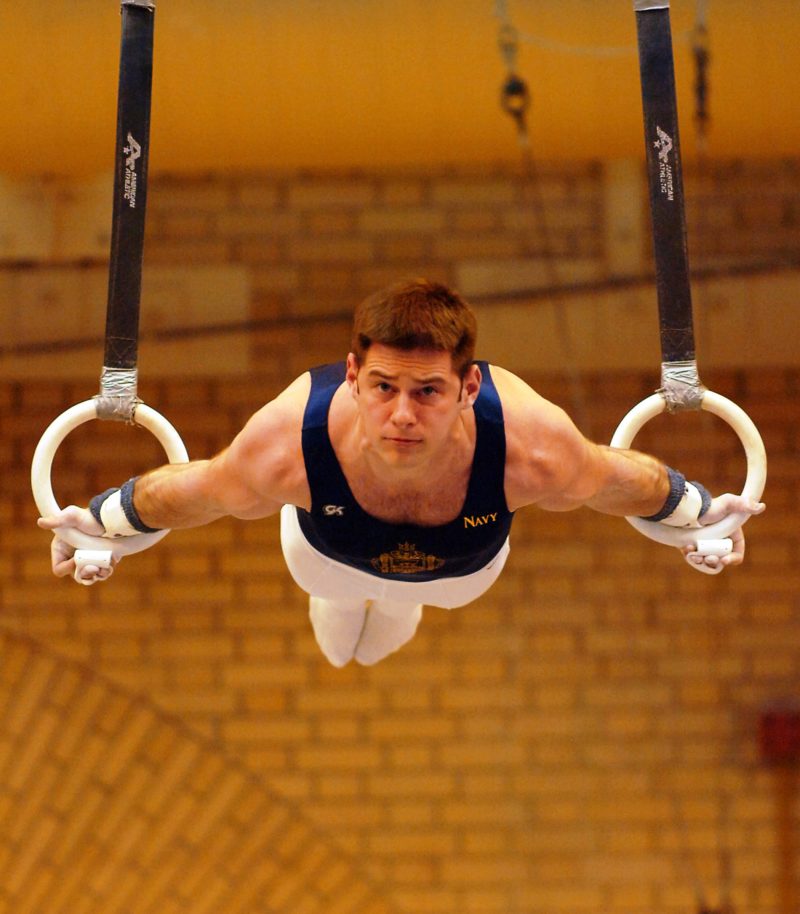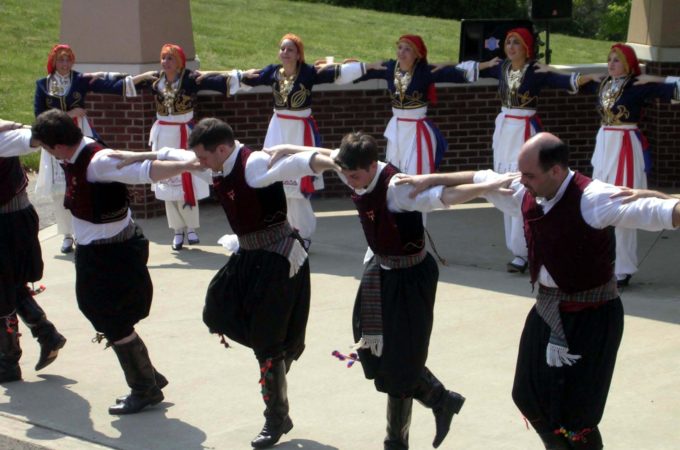How does the life of the Trinity and the image of the Great Dance help us understand the matter of form and freedom?
Freedom without form is anarchy. Form without freedom is tyranny. Both of these options lead to enslavement. But form and freedom operating as perichoresis, the great dance, result in life.
 C.S. Lewis scholar Thomas Howard has written a remarkable book, Chance or the Dance?[1] The author contrasts the modern, Darwinian world with the premodern, Judeo-Christian world. Howard’s insights and prose are so profound that I will let him speak with little commentary. Please take the time to savor the language and reflect deeply on the concepts.
C.S. Lewis scholar Thomas Howard has written a remarkable book, Chance or the Dance?[1] The author contrasts the modern, Darwinian world with the premodern, Judeo-Christian world. Howard’s insights and prose are so profound that I will let him speak with little commentary. Please take the time to savor the language and reflect deeply on the concepts.
Freedom comes from discipline
Howard speaks of the premodern, Judeo-Christian faith that led to true human freedom.
For it is in these limitations that the old myth [the pre-modern Judeo-Christian worldview – the dance, in contrast to the new myth of the Darwinian worldview – chance] found the definition of freedom. Whatever freedom was, it was to be found, ironically, via the strait gate. It was thought of not as a matter of self-determination but rather as a matter of the capacity to experience one’s own perfection as joy. The question for Adam and Eve was not that they enjoy a realm in which no strictures existed: it was, rather, that they learn to will what was, in fact, the case—what they couldn’t escape anyway. That is, in that story, death would follow, willy-nilly, such and such an act. Since that was the case, and couldn’t be changed, they had two possible types of freedom open to them: either to assert their autonomy, live in illusion, and find out in the end that it was no autonomy; or to assent to the way things, alas, were, and see if the matter of freedom weren’t something vastly different from what they might have supposed it to be. It was, according to that story, the way things are that the being called man exists as creature; the most noble creature, to be sure, but still creature; the lord of creation, yes, but holding that creation in vassalage to the great Lord of it all. That was the picture of human existence in the story, so that the question of freedom was one of discovering the conditions of that lordship and vassalage and assenting to them, rather than an idea of self-determination. The joker was, however, that they tried the latter idea. Like Pandora and the rest of us, they were convinced that it was worth doing what they inclined at the moment to do, and the devil take the consequences. Which is precisely what he did.
Perfection is better than personal autonomy
Howard then says that freedom is found in living within the circle of God’s created order. It is in perichoresis that one masters the form that leads to freedom.
Freedom in that story, then, was a matter of uncoerced assent to what was given. Man, unlike the animals, was unique in his liberty to choose whether or not to offer that assent. But there was a scale of values in which freedom itself was not the summum bonum; it was ancillary to the greater matter of perfection. That is, mere self-determination would have been seen as tragically limiting, in that it cut one off from the Dance. Your freedom in the Dance is to be able to execute your steps with power and grace, not to decide what you feel like doing. The point, to that mind, was there is, like it or no, a Dance going on, and one may join or not. (One thinks of the Mock Turtle’s “Will you, won’t you, will you, won’t you, won’t you join the dance?”) That option is a small freedom, to be sure; one isn’t obliged to dance. But that option is not what is understood by the old myth as freedom. Freedom would have been understood as something like power or joy. And it stood at the far end, often, of renunciation or denial or austerity. The implication, for instance, of the Adam and Eve story is that if they had bowed to the interdict placed on the forbidden fruit, life and not death would have been the guerdon. That is, paradoxically, if they had knuckled under to what looked emphatically like a denial of their freedom (“Thou shalt not” is not a very convincing corollary to the “Have dominion” charge), they would have discovered something unimaginable to them—something that, according to the story, was at that very point lost to them and us for the duration of human time.
The freedom of the athlete is the ability to perform well
Malcolm Gladwell pointed out that “elite performers,” those who achieve phenomenal success as musicians, for example, do so at the end of the 10,000 hours of practice. This parallels what Thomas writes: freedom is found in the excellence and perfection derived from supreme self-sacrifice and discipline.
 The thing at stake in that story is at stake everywhere. What is the glory of the sun and moon and stars? Is it not at least partly that they exhibit a solemn and mathematical precision in their courses, a great astronomical sarabande or minuet? One doesn’t think of the frug or the panic when one thinks of the stars. Whatever their glory is (and it registers itself on our consciousness as wholly satisfying, mathematically and aesthetically), it does not involve either self-determination or randomness. Similarly, what is the freedom of the athlete? His excellence is a matter of power—the power to do the thing beautifully. The perfection of the jump stands at the far end of a program of renunciation, in which his inclinations were subordinated to the demands of that very perfection. Or the race horse: there is something lovely about a wild horse snorting over the hill, but all that spirit and muscle must be brought under the rigor of bits and bridles and schedules if the special excellence of racing is sought. And the sonnet: here words dance in their highest dignity and beauty; here is language at its most excellent—but it is language dragooned and hedged and crowded and thwarted by rules. But, ironically, at the far end of those awful rules there emerges perfection. Or music: I may flog the keyboard with great zest for as long as I please, and a certain effect will be gained, and I may experience the release of whatever it is that wants to be thus released; but there is not a moment’s comparison between that “freedom” and the austere perfection of a Mozart sonata. In the latter the notes are subordinated to a special design involving sequence and interval and rhythm and melody and harmony, and in that very subordination emerge in their own special excellence.
The thing at stake in that story is at stake everywhere. What is the glory of the sun and moon and stars? Is it not at least partly that they exhibit a solemn and mathematical precision in their courses, a great astronomical sarabande or minuet? One doesn’t think of the frug or the panic when one thinks of the stars. Whatever their glory is (and it registers itself on our consciousness as wholly satisfying, mathematically and aesthetically), it does not involve either self-determination or randomness. Similarly, what is the freedom of the athlete? His excellence is a matter of power—the power to do the thing beautifully. The perfection of the jump stands at the far end of a program of renunciation, in which his inclinations were subordinated to the demands of that very perfection. Or the race horse: there is something lovely about a wild horse snorting over the hill, but all that spirit and muscle must be brought under the rigor of bits and bridles and schedules if the special excellence of racing is sought. And the sonnet: here words dance in their highest dignity and beauty; here is language at its most excellent—but it is language dragooned and hedged and crowded and thwarted by rules. But, ironically, at the far end of those awful rules there emerges perfection. Or music: I may flog the keyboard with great zest for as long as I please, and a certain effect will be gained, and I may experience the release of whatever it is that wants to be thus released; but there is not a moment’s comparison between that “freedom” and the austere perfection of a Mozart sonata. In the latter the notes are subordinated to a special design involving sequence and interval and rhythm and melody and harmony, and in that very subordination emerge in their own special excellence.
The Dance will go on
Let freedom ring. Let the freedom forged within the form of Creation ring from time into eternity. May all that is beautiful, all that is created with excellence and perfection in human history, be showcased in the halls of heaven.
The old myth would have seen all these phenomena as images—images of some paradox that lay at the heart of things: that freedom for a thing is that state in which it appears at its highest performance (its perfection, in other words), and that this is a state that lies on the farther side of rigor and austerity. And it would have seen all these images as suggesting not a moral servility for that unique creature Man, but rather the brilliant display, under a thousand forms, of the Dance, which goes on aeon after aeon, and which waits all breathless with hope for the Man to recognize the pattern, see his place, assent to it, and join. He may or he may not; that is his option. But his freedom is the ecstatic experience of the joyous measure whose music rings from galaxy to galaxy.
Forsake the tyranny of chance! Join the freedom of the dance!
- Darrow Miller
[1] Howard, Thomas. Chance or the Dance? 2nd Edition: A Critique of Modern Secularism (Kindle Location 1274). Ignatius Pr. Kindle Edition.






